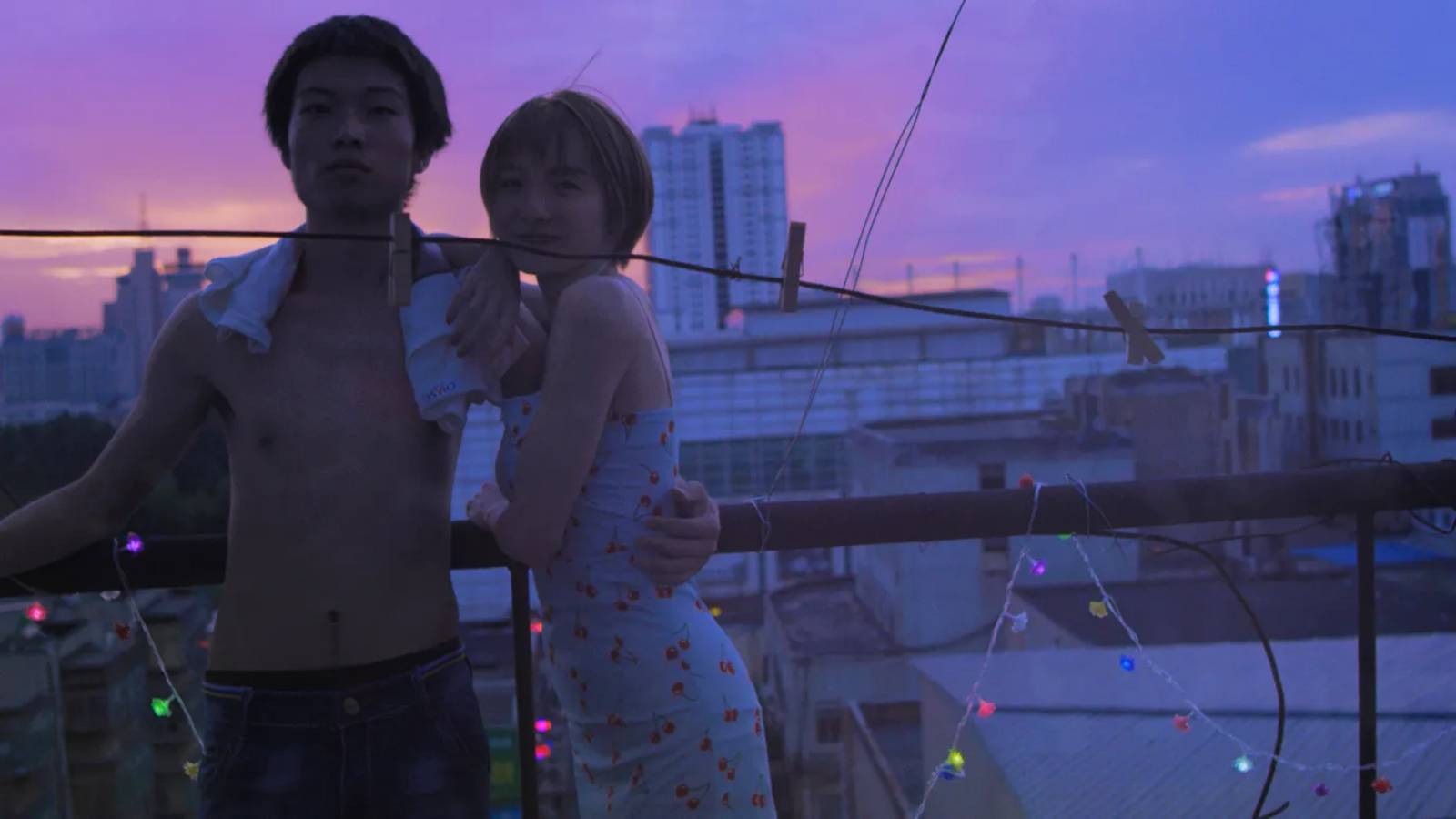If a film could immortalize our screen-infested age, what would it look like? Restlessly playful and joyfully cacophonous, YuHan Teng’s Gagaland offers an eloquent snapshot of our Very Online Lives. It captures not just the way we can’t seem to stop soaking up streaming images, but also how that bulimic consumption has changed the way we perceive reality and carry ourselves into it. The plot, a boy-meets-girl crossed with a rags-to-riches parable, couldn’t be more familiar. But in framing it so convincingly within our digital zeitgeist, Teng makes the conventional feel uncanny, and her first feature, narratively slight as it may be, is a boisterous product of its time, a singular oddity that allows social media to shape its very fabric.
At the center of it all is K.D. (Qiao JianNan), a small-town Chinese teen who flees his job to join a band of street urchins busking for likes and fans through their live-streamed gaga dance routines. Gagaland is the story of K.D.’s incredible ascent to the country’s greatest gaga dancer, and a tribute to the dance itself: a carefree, flamboyant, everything-goes freestyle that sends throngs of Chinese twirling in public places before confused passersby and millions of followers watching them from their phones. It’s also a portrait of the quartet who yanks K.D. from the streets and turn him into a virtual sensation––a band of drifters led by Pink Hair (DongLin Gu), a middle-aged barber turned-gaga dance guru, and K.D.’s flame B-Girl (MengLi Zhu).
You already know where this is going. In charting the lad’s meteoric rise, Teng ticks the most well-trodden tropes and beats. There are internal feuds, jealous rivals, a career-defining championship, the obligatory mentor-mentee clash, and a love story doomed by fame and its excesses. But what Gagaland lacks in narrative complexity it more than makes up for with aesthetic virtuosity. Time and again, dancers remind us via smartphone confessionals that gaga dance amounts to a liberating force, a source of solace (“it makes me feel secure”) and strength (“I can be whoever I want”). I’m still not convinced the film elucidates what this may mean in practice; for all their talk about empowerment and freedom, characters don’t ever seem able to transcend their outcast status––if anything, Teng makes sure to give a few gaga detractors room to vent their anger at the “vulgar” spectacle that’s plaguing the country’s streets and squares.
But her film shows genuine affection for Pink Hair, his four disciples, and their craft. The gaga dance was a real-life craze that swept across China in the not-so-distant past. So was its maven who died of a tumor in 2021. For all its detours in the realm of digital fantasy, there are moments when Gagaland courts documentary terrain, as in the behind-the-scenes coda featuring the crew interacting with the ailing DongLin Gu, or the several smartphone videos capturing dancers and crowds around the country. It also demonstrates a staunch, unwavering belief in the soul-nourishing aspects of the art––if you can call it such––and the promises of self-actualization offered by the Internet. There may be a tenuous, cross-oceanic parallel to be made between Gagaland and Jane Schoenbrun’s We’re All Going to the World’s Fair. Like Schoenbrun’s film, Teng’s marks a refreshing rupture from the more conservative, alarmist tone of parables about the dangers of screen-mediated lives, offering instead a foray into the world of streaming that’s as in tune with its pitfalls as it is with its many possibilities for communion, solidarity, and affirmation.
More than anything, though, it succeeds in translating the dance’s kinetic energy into a visual cornucopia. WeChat live streams, reels, and videos aren’t interludes so much as part of Gagaland’s fabric, and Teng stitches them together in an endless procession of clips peppered with emojis and giant-sized captions that double as a kind of live commentary. K.D.’s story is a social-media story––his ascent is at once recorded through online platforms and propelled by them––and Gagaland trails behind him like a hummingbird on speed, furiously cutting between his struggles under Pink Hair’s guidance (call that the “conventional” film) and the digital world where these are disassembled and reinterpreted for crowds of millions. What you’re left with is a curious hybrid––half-film, half-feed––and Teng purposely blurs the boundary between them. Where she struggles is in keeping the journey an even ride; watching K.D. pursue his delusions of grandeur, you’re reminded that the plot never wholly lives up to the brio and pace of these images. At worst, Gagaland makes for a lopsided journey with one track running faster than the other; at best, its hysterical dance between online images and reality doesn’t elicit asphyxia, but an irreverent, subversive pandemonium.
Gagaland premiered at the International Film Festival Rotterdam.

